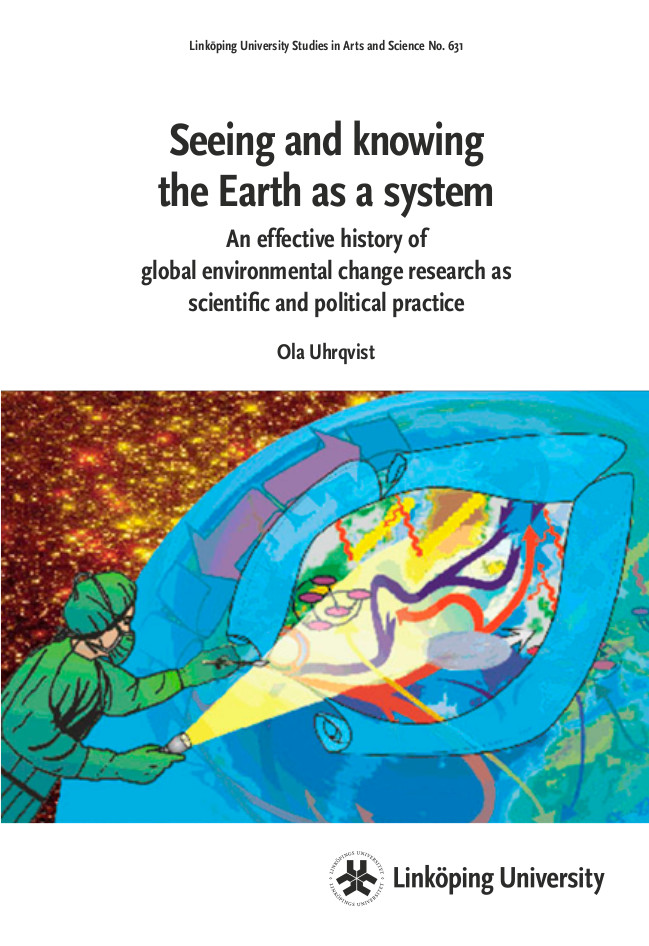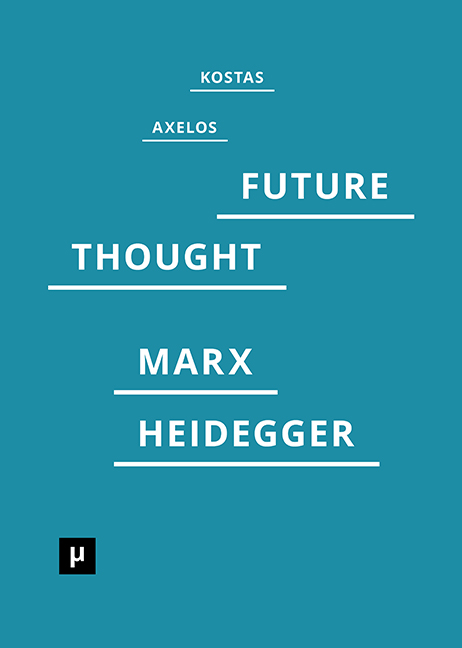Ola Uhrqvist: Seeing and Knowing the Earth as a System: An Effective History of Global Environmental Change Research as Scientific and Political Practice (2014)
Filed under book, thesis | Tags: · anthropocene, climate crisis, earth, earth system, environment, governance, knowledge, knowledge production

“Previous research connecting scientific knowledge production with governing of the global environment usually start in international climate change negotiations and related assessments. From that vantage point Earth system science and models are studied as an expansion of Global Circulation Models. By tracing of the history of the present Earth system outlook this thesis offers a reflection about how scientific knowledge produce and connects problems with descriptions of desired order of things and strategies to get there. Knowledge becomes a productive power by shaping fields of possible action in relation to the global environment.
The interpreted empirical material consists of scientific discussions from the International global environmental change programmes and particularly the International Geosphere-Biosphere Programme (IGBP) and the International Human Dimensions Programme on global environmental change (IHDP). The studied period spans from the start of the planning of the IGBP in 1983 to the presentation of the new research programme Future Earth in 2013. The thesis is organised around the effects of the IGBP’s strategy to use predictive Earth system models as a tool to bring a broad range of scientific disciplines together.
The results demonstrate the historicity of the present Earth system outlook by showing how ecosystems and human dimensions were attributed new and more important roles as drivers of global change. The thesis also argue for the need to approach the ‘Earth system’ as a result of a productive tension between top-down perspectives found in global modelling and bottom-up empirical research engaging with process interactions down to local scales.”
Publisher Linköping University Electronic Press, Linköping, 2014
Open access
ISBN 9789175192369
91 pages
PDF, PDF (updated on 2018-6-11)
Comment (0)The Anthropocene Review, 2(2): When and How Did the Anthropocene Begin? (2015)
Filed under journal | Tags: · anthropocene, climate crisis, earth, environment, geology, human, science

“In March of this year, Nature published a stimulating article by Simon Lewis and Mark Maslin entitled Defining the Anthropocene (Lewis and Maslin, 2015). In it, they proposed criteria for determining the formal onset of the Anthropocene Epoch and from these, derived new starting dates. They proposed two alternatives, ad 1610 and ad 1964. The former date lies some two centuries before the date proposed by Crutzen and Stoermer (2000) in their paper introducing and providing both a definition and a starting point for the Anthropocene. The latter date is over a decade later than an alternative and increasingly discussed onset date arising from Steffen et al.’s paper (2007) identifying a ‘Great Acceleration’ in detectable human impact on the Earth System beginning in the mid 20th century. These new proposals have provoked a great deal of interest and debate.
In this issue of The Anthropocene Review, we have tried to provide a timely account of this debate. The first four papers comprise contrasted ‘comments’ on the Nature article, followed by ‘replies’ from its authors. The issues raised are far from forming a sterile debate on starting dates. They are full of, and indeed go well beyond, the engaging scientific basis upon which the contrasted points of view rest.” (from the Editorial)
Editor: Mike Oldfield
Publisher Sage, August 2015
ISSN 20530196
91 pages
PDF (2 MB)
Comment (0)Kostas Axelos: Introduction to a Future Way of Thought: On Marx and Heidegger (1966/2015)
Filed under book | Tags: · earth, labour, philosophy, philosophy of technology, production, technology

“‘Technologists only change the world in various ways in generalized indifference; the point is to think the world and interpret the changes in its unfathomability, to perceive and experience the difference binding being to the nothing.’
Anticipating the age of planetary technology Kostas Axelos, a Greek-French philosopher, approaches the technological question in this book, first published in 1966, by connecting the thought of Karl Marx and Martin Heidegger. Marx famously declared that philosophers had only interpreted the world, but the point was to change it. Heidegger on his part stressed that our modern malaise was due to the forgetting of being, for which he thought technological questions were central. Following from his study of Marx as a thinker of technology, and foreseeing debates about globalization, Axelos recognizes that technology now determines the world. Providing an introduction to some of his major themes, including the play of the world, Axelos asks if planetary technology requires a new, a future way of thought which in itself is planetary.”
First published as Einführung in ein künftiges Denken: Über Marx und Heidegger, Niemeyer, Tübingen, 1966.
Edited and with an Introduction by Stuart Elden
Translated by Kenneth Mills
Publisher meson press, Lüneburg, June 2015
Creative Commons BY-NC-ND 4.0 License
ISBN 9783957960061
178 pages
Review: George Tomlinson (Marx & Philosophy 2016).
Comment (1)
